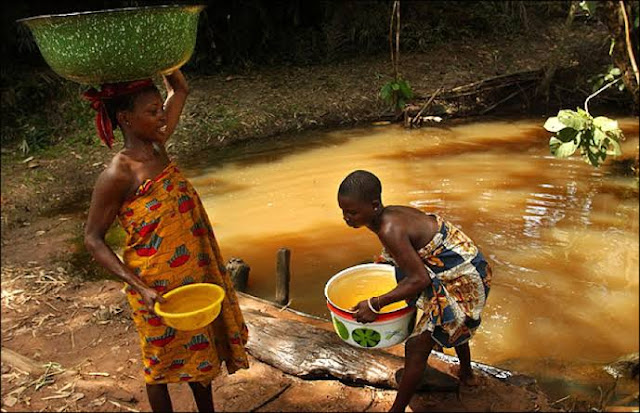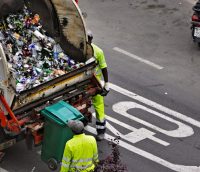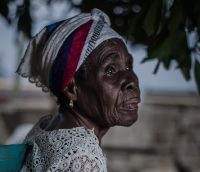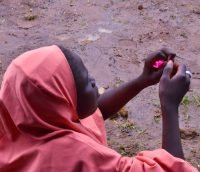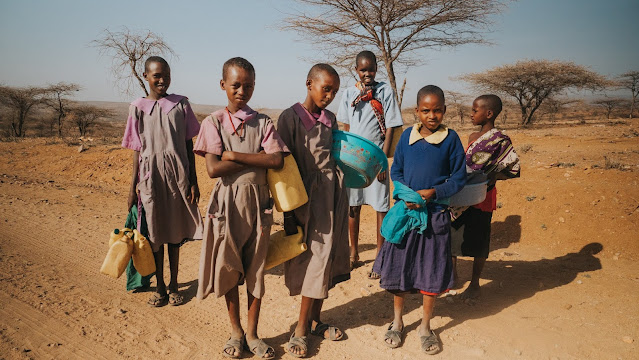 |
| Photo by Tucker Tangeman on Unsplash |
THROUGH THE EYES OF OJONUGWA YAHAYA
INTRODUCTION
Located in an atmosphere of serenity and decorated with the rich savannah vegetation, the communal life and practice of trade by barter is still held with great prestige in the community of Ojokpachi-Odo.
Ojokpachi is one of the villages in Omala Local Government Area (LGA) of Kogi State.
The years I spent growing up with my grandmother in Ojokpachi would have been nothing short of amazing and enjoyable if we had access to clean and accessible water. The major source of water in the community is the stream (Oche and Oshumamanyi), while those that can afford hand-dug wells have it close to their compounds. The quality of the well water is determined by the nature of the soil where the well is situated, and it is not all the available wells that produce good, safe water.
The well in my family compound produces hard water (highly concentrated in calcium and magnesium carbonates, bicarbonates and sulphates). The water is not good for drinking. We usually manage it for other domestic use such as cooking, bathing and washing, though the water does not lather well with soap, so it does not really wash cloths clean and ends up leaving the skin looking white and dry after every bath.
During the raining season, we practice rainwater harvesting; a practice where my grandmother usually collects drinking water into special clay pots. The journey of water collection to the nearby stream during raining season is usually much easier, even with the distance of about 6 kilometres. Because the stream is full, and water flows freely during this time, we can make up to five (5) trips at a stretch. It is important to note that water collection in most households in the community is predominantly done by women and girls, making life difficult for women and girls.
When school is in session, children of school age like me normally go for water collection first thing in the morning before setting off to school. When we get to school, some of us are assigned to fetch water to teachers houses as part of our labour duties. On getting home and having a rushed lunch, we set off for another round of water collection for the household until the available large water containers are filled up. It is an everyday routine. When school is not in session, we usually fetch water before going to farm.
During the dry season when water scarcity reaches its peak, when the stream dries up and wells do not get to produce enough water, life in the village become as hard as you can imagine. We have to walk several miles – beyond 6 kilometres – in search of water. Women and girls set out as early as 3:00am or as soon as the cock crows to go in search of water, carrying touch lights in their hands. Women use cutlass to dig shallow ponds in the moist part of the stream, which is now dried, then wait patiently for the water to gather before scooping it with a little bowl into to a larger round container/basin which is equivalent to 25 litres keg. The queue usually become very long as the day breaks, sometimes water collection may take the whole day. The best time to get water from the shallow pond is very early in the morning or at midday when most people have gone to the farm, because the moment most of the people get back from farm the queue become unbearable. Sometimes, after waiting for hours, and getting to evening when the sun finally disappears, one may return home with an empty container. When the water situation becomes tougher, women and their children (girls) take time off farming activities completely to dedicate more days to fetching water. In this case the mother will be at the water source, scooping water from the hand-dug pond… scooping and waiting for it to gather again as if she is counting every drop, while the children will concentrate on carrying the water home. The journey home is never easy at this point, as our neck aches, with the centre of the head pleading for freedom from the water load, and shaky legs climbing the stony hill and walking the sloppy paths. The feet feels the hardness of the stones under the flip-flop slippers and bodies soaked with the constant droplets from the edge of the large basin, balanced on the head and held with both hands. One trip can take one and half hours.
In some cases men who have bicycles go farther along the farm road with their kegs tied to the back of their bicycles in search of where the stream had formed a pond and is yet to dry up. Though the water gotten from there is usually dirty, brownish in colour and has odour due to dry leaves falling into the pond or as a result of cattle coming to drink from it. Usually when men fetch water, it is for their own personal use: for laundry and bathing and not for the entire household use as they believe that fetching water for the household is the duty of women and girls.
My grandmother use to join us to fetch water but at a point due to old age, she did not have the strength to carry water, or wait on the queue to scoop water from the shallow hand-dug pond. But whenever me and my little sister go for water collection, she appreciates us a lot, calling us sweet names or our clan’s greeting name (Oyowo-gida), and adding larger portions of dry fish to our dinner. My grandmother feels our pains and wishes she could help. On several accessions, either me or my sister will return from the stream with swollen face from bee stings and my grandmother will cry and say we should not go to collect water again, but if we do not go how are we going to have water at home for our domestic needs? After crying together, we will still go for water collection the next morning.
The two central wells available in the community, one sited in the community primary school and the second one in the community secondary school, were donated by the Local Government Area Development Program. The wells are normally under lock and key and mostly enjoyed by the teachers, though during the peak of water scarcity in the dry season, it is usually opened twice a week at specific hours for general use. The queue is usually too long, and people tend to fight over who came first, sometimes ending up breaking each other’s buckets/bowls or even inflicting injury on each other. So, going to the central well is usually not encouraging.
Diarrhoea and cholera are prevalent diseases among children in the community due to the consumption of contaminated water. In the community, diarrhoea has led to the death of many children under the age of five years, but because of ignorance and lack of awareness the people blame the deaths of these children on witchcraft. As a child I was always in and out of a diarrhoea episode, especially during dry season. My grandmother will spend the little money she had buying drugs for me but sometimes, she will be left with no option but to prepare herbal medicine for me which was always a struggle for me to drink. Most times, I ended up pouring it away once she is not watching. I always missed out of school whenever I am having diarrhoea because it is hard to concentrate in class while I needed to rush out frequently to pooh.
There was a time I visited my mother’s elder sister who is a nurse in Ogumogbo, a community in Benue State where trade by barter is still practiced till date. The common commodity is fish which they exchange for farm produce such as yam, cassava flour, millet, corn etc. People from my village trek several kilometres to Ogumogbo market, carrying their heavy loads of farm produce on their head, to exchange for fish. It was fish harvesting season, so I had so much fish to eat and I developed an episode of diarrhoea which almost claimed my life. Within five minutes, I would have gone to toilet twice. Open defecation was highly practiced there so it was just a matter of me running to the bush path close to a swampy rice farm to pooh. I remembered at a point one of the neighbours noticed my suffering and she told me not to bother running to the bush path again, that I should defecate at the back of her house and she will pack it when I am done, It was the greatest act of kindness I needed at that point and I was really grateful. The diarrhoea defiles all orthodox medications. So, after five days without improvement, my aunty had to speak to an old man whose house is not too far from ours. After he was informed, he said they should have informed him much earlier instead of allowing me to suffer for days. He immediately ordered a young man in our compound to go cut a particular root of a tree from the bush. They gave me to use as chewing stick and in less than an hour, the diarrhoea stopped. It was an unforgettable episode. We thought the diarrhoea was as a result of me consuming too much fish but no, it was as a result of me consuming contaminated water. The large river where the Ogumogbo community people collect domestic water from is highly contaminated, and sometimes you can see human faeces floating on the river while trying to fetch water. The open defecation over there was that bad.
Presently the water situation in Ojokpachi-Odo has improved a little bit because there are more compound-owned wells now but they are still far from having access to clean water. And diarrhoea disease is still prevalent among children there. Open defecation is still at its peak in the community, people hardly consider toilet construction as important.
THE STATE OF ACCESS TO CLEAN WATER IN NIGERIA
On 28 July 2010, through Resolution 64/292, the United Nations General Assembly explicitly recognized the Human Right to Water and Sanitation and acknowledged that clean drinking water and sanitation are essential to the realisation of all human rights.
Nigeria is a party to the United Nation declaration of the Human Right to Water, which entitles everyone living in Nigeria to sufficient, affordable, safe and clean water for personal and domestic uses. But the WHO/UNICEF Joint Monitoring Program (JMP) report indicateS that 60 million Nigerians are still without clean water close to home. However, I am of the opinion that this figure is a little bit conservative in the sense that as Nigerians, we are very much aware that the larger percentage of our population reside in the rural areas. The World Bank’s statistics indicates that about 51 percent of Nigeria population reside in rural areas and it an obvious knowledge that the rural population do not have access to clean water, so more people could be lacking water beyond the statistics of 60 million people.
With the number of people still deprived of access to clean water in Nigeria, the sad reality is that at this moment we are off track in achieving the 2030 targets of (Sustainable Development Goal) SDG 6.1 – By 2030, achieve universal and equitable access to safe and affordable drinking water for all. And SDG 6.4 – By 2030, substantially increase water-use efficiency across all sectors and ensure sustainable withdrawals and supply of freshwater to address water scarcity and substantially reduce the number of people suffering from water scarcity.
WHY IS CLEAN WATER IMPORTANT?
Without easy access to clean water, people’s health suffer – diarrhoea, infections, skin conditions, river blindness and trachoma all these diseases can be linked to dirty water.
You are less able to earn an income or spend time with your family – if someone responsible for fetching the water for a family of four lives half an hour from a source of clean water then they will spend a total of two and half months every year on fetching water alone. This is time that could be creatively spent in boosting the household income or caring for the family. Much time being spent on water collection for the households is one of the factors keeping rural women in extreme poverty.
For children, particularly girls, their education often suffers due to being late to school after fetching water in the mornings. Also, without clean water in schools, girls cannot manage their menstruation with proper hygiene. In some cases, girls miss school during their menstruation when there is no access to clean water in the school.
The lack of adequate water provision makes good sanitary practices difficult. Inadequate water is often one of the top reasons given by community dwellers for practicing open defecation. To eradicate open defecation there have to be adequate water provision across local communities Nigeria, as 47 million people in Nigeria still defecate in the open.
Water scarcity is capable of breeding communal dispute as people struggle over the available water source: misunderstanding can occur among them, leading to quarrels, fight and strife which can turn into full blown communal clash.
According to UNICEF, poor access to improved water and sanitation in Nigeria remain a major contributing factor to high morbidity and mortality rates among children under five. The use of contaminated drinking water and poor sanitary conditions result in increased vulnerability to water-borne diseases, including diarrhoea – which leads to deaths of more than 70,000 children under five annually. 73% of diarrhoea and enteric disease burden is associated with poor access to adequate water, sanitation and hygiene (WASH), and is disproportionately borne by poorer children.
CONCLUSION
Water scarcity has a human face and the frequent noticeable faces are that of women and girls on whose shoulders the duties of water collection for their households usually falls. The number of hours spent on fetching water has deprived many women, particularly women in rural communities, of participating in self empowerment and economic activities that prevents them from sinking them deeper into poverty. Girls of school age miss out of lesson hours or sometime miss out of school completely due to the time spent on fetching water. It is high time urgent attention is given to the area of adequate water provision through adequate budget allocations and implementation of water supply projects to ease the people of their suffering.
The responsibility of water supply in Nigeria is shared between three levels of government – Federal, State and Local. The Federal Government is in charge of water resources management; State Governments have the primary responsibility for urban water supply; and Local Government together with communities are responsible for rural water supply.
Access to clean water is a human right issue and it is the right of the citizenry to have clean, safe water source close to their homes. It is on this note that I am urging the Nigeria’s three tiers of government to work in synergy toward ensuring provision of adequate, clean and affordable water for all.

